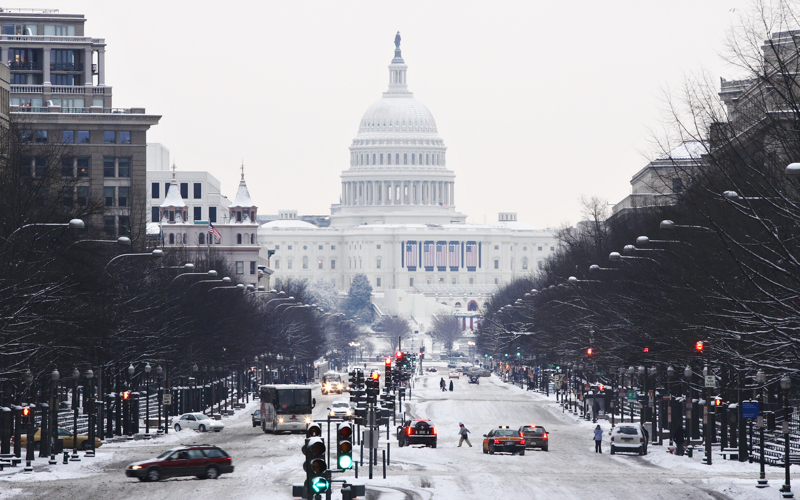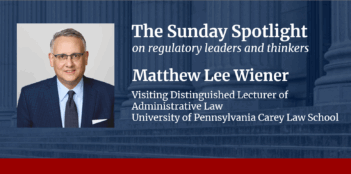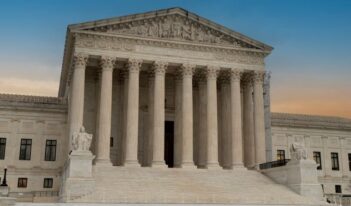
The Regulatory Review highlights the top essays written by our contributors in 2019.
The Regulatory Review is pleased to highlight our top regulatory essays of 2019 authored by a select number of our many expert contributors. These opinion pieces, which qualify for this list based on the number of page views during the past 12 months, are arranged below in alphabetical order by last name of author.
Making Law Student Mental Health a Priority
May 15, 2019 | Benjamin A. Barsky and Theodore W. Ruger, University of Pennsylvania Law School
Without access to mental health resources, students may feel ill-equipped to tackle the problems from which they may suffer. This reality should make law schools accountable for the improvement of student well-being.
The Future of Administrative Law Judge Selection
October 29, 2019 | Jack Beermann, Boston University School of Law
The U.S. Supreme Court’s decision last year in Lucia v. SEC has appeared to inspire dramatic changes to the appointment of administrative law judges. The reforms effectuated by the executive order that followed Lucia were welcomed by many agencies that for decades felt hamstrung by the old hiring process.
Make Benefit-Cost Analysis Meaningful
January 7, 2019 | James Broughel, George Mason University
Without a clear welfare measure, benefit-cost analysis is like a rudderless boat adrift at sea. It can be a useful tool, but to be truly useful in practice, first benefit-cost analysis has to measure something meaningful in theory.
Regulatory Vigilance in a Changing World
February 25, 2019 | Cary Coglianese, University of Pennsylvania Law School
Nearly everyone sings innovation’s praises. Innovation brings progress and prosperity. It leads to a better tomorrow. Yet, is innovation really an unalloyed good? In a new book, legal scholar Cristie Ford argues that innovation actually “presents a clear and persistent risk to regulation itself.”
What Does Risk-Based Regulation Mean?
July 8, 2019 | Cary Coglianese, University of Pennsylvania Law School
With the benefit of careful risk assessments, regulators can understand more precisely what the true risks of different activities might be, thereby enabling them to make better decisions about how to prioritize the allocation of regulatory resources and ultimately how to manage the risks.
Using Machine Learning to Improve the U.S. Government
August 12, 2019 | Cary Coglianese, University of Pennsylvania Law School
Just as machine-learning algorithms have facilitated dramatic innovations in the private sector, they can also enable governments to achieve better, fairer, and more efficient performance of key functions.
The Semi-Autonomous Administrative State
October 7, 2019 | Cary Coglianese, University of Pennsylvania Law School
When distinguishing between so-called independent agencies and executive agencies, the concept of “autonomy” is better suited than the concept of “independence” when balancing agency insulation and accountability.
Private Standards and Public Governance
November 4, 2019 | Cary Coglianese, University of Pennsylvania Law School
A new book on private standards would seem to suggest that the need for public regulation will not be erased by private standards any time soon, even as standards are likely to continue to be needed to solve critical coordination problems.
Who Are Gig Economy Workers?
April 9, 2019 | Deepa Das Acevedo, University of Alabama
The gig economy continues to confound courts and workers alike—nowhere more so than when the workers in question are drivers for transportation network companies like Uber and Lyft. In 2018 alone, federal and state courts in Pennsylvania arrived at virtually opposite conclusions about whether Uber drivers are “employees.”
Deregulation, Reagan-Style
March 13, 2019 | Jefferson Decker, Rutgers University-New Brunswick
Many Reagan Administration appointees did not distinguish between economic and social regulation in the same way as President Reagan did—indeed, several members of his Administration proved far more hostile to the latter than the former.
A Brief History of Regulation and Deregulation
March 11, 2019 | Susan Dudley, George Washington University
Ever since Congress created the first federal regulatory body more than 130 years ago, people have debated the proper role for what has been called the “fourth branch” of government. This essay provides a brief history of regulation and deregulation, reviewing the key milestones that have shaped regulatory practices in the United States from the mid-1900s to the presidency of Donald J. Trump.
Regulating Work in an Age of Fissuring and Automation
April 8, 2019 | Cynthia Estlund, New York University
The rise of both fissuring and automation imperils the stability of employment as a platform for delivering a range of basic social entitlements, and points toward shifting the locus of some of those entitlements, as well as their costs, off employment and onto a broader and more redistributive revenue base.
Considering Cumulative Regulatory Costs in Economic Analysis
June 25, 2019 | Mark Febrizio, George Washington University
The Council of Economic Advisers’s annual Economic Report of the President discusses the importance of paying closer attention to the cumulative costs of regulation. It argues that the current process for assessing the costs and benefits of regulation is too narrowly focused on individual regulations because “the regulatory whole is greater than the sum of its parts.”
When it Comes to Federal Stem Cell Regulation, Less is More
September 17, 2019 | A. Rahman Ford
Concerns over the safety of patients receiving Stem Cell Therapy (SCT) are reasonable but calls for increased regulatory enforcement of SCT is premature. At a time when an increasing number of Americans suffer from debilitating chronic medical conditions, we need more medical choice, not less.
Do the Results of the EU Better Regulation Program Match Its Ambitions?
April 1, 2019 | Elizabeth Golberg, Harvard University
The 2015 Better Regulation program has generated positive results, but dissatisfaction with European Union-level regulation continues to permeate the European political landscape. The next Commission needs to build on this progress and maintain the goal of achieving better regulation as a high priority.
Deregulation Drains Government Expertise
March 14, 2019 | Marissa Martino Golden, Bryn Mawr College
What these two time periods highlight are progressive efforts to take politics out of administration and presidential efforts to bring politics—and responsiveness—back in. It is only within this context that both Reagan’s and Trump’s deregulatory efforts can be understood.
Defining Equity in Algorithmic Change
February 11, 2019 | Ellen P. Goodman, Rutgers Law School
Any complex computational problem can be solved with an algorithm. But there is a growing literature on the things we might worry about in the model that makes up the algorithm, including unfairness, opacity, and a lack of due process.
Can Hip Hop Save Rulemaking?
August 5, 2019 | James Goodwin, Center for Progressive Reform
Art offers several unique advantages for re-democratizing the rulemaking process, especially those art forms that might be thought of as folk art, which are characterized by their authenticity, universal accessibility, and distinct cultural significance.
The Search for Sound Vocational Evidence in Disability Adjudication
July 1, 2019 | Jeremy Graboyes, Administrative Conference of the United States
For six-and-a-half decades, the Social Security Administration (SSA), the courts, and Congress have engaged in a tug-of-war over vocational evidence to support consistent disability adjudication. A new source of occupational evidence has the potential to revolutionize SSA decision-making.
Tribal Regulation of Single-Use Plastics
April 23, 2019 | Cynthia R. Harris, Environmental Law Institute
As original inhabitants, traditional users, and stewards of the land, Indigenous peoples in the U.S. have long led the way in natural resource management and environmental protection. Unsurprisingly, several tribes are moving forward to reduce single-use plastics on tribal land.
Gundy, Nondelegation, and Never-Ending Hope
July 8, 2019 | Kristin E. Hickman, University of Minnesota Law School
The Supreme Court has repeatedly upheld statutory provisions calling for agencies to adopt such regulations as are “reasonable,” “feasible,” “in the public interest,” or some equally vague term—leading many commentators to declare that the nondelegation doctrine is dead. Yet the nondelegation doctrine, like hope, springs eternal.
FTC v. Qualcomm, Antitrust, and Intellectual Property
June 11, 2019 | Erik Hovenkamp, University of Southern California Gould School of Law
A recent decision in the U.S. District Court for the Northern District of California represents a significant development in the antitrust–IP interface and will surely influence future cases and commentaries in the field.
The Warren Campaign’s Antitrust Proposals
March 25, 2019 | Herbert Hovenkamp, University of Pennsylvania
One of Senator Elizabeth Warren’s proposals is similar to the Trump Administration’s strategy of protecting coal at the expense of sustainable energy sources. Both strategies favor older technologies in danger of being displaced—fossil fuel companies in the case of the Trump Administration and traditional retail firms in the Warren proposal.
Are Regulatory Agreements to Address Climate Change Anticompetitive?
September 11, 2019 | Herbert Hovenkamp, University of Pennsylvania
The U.S. Department of Justice has launched an investigation of four automakers to determine if they had violated antitrust laws by agreeing with the state of California to adhere to higher standards for tailpipe emissions. Proving an antitrust violation in this case would confront significant hurdles.
Is the Fiduciary Rule Dead?
April 10, 2019 | Gregory F. Jacob, O’Melveny & Myers LLP
Following a court decision to strike down the controversial Fiduciary Rule it remains unclear who the Department of Labor considers to be an investment advice fiduciary. The investment community is left to speculate about the fate of the rule a full year after it was held unlawful.
The Clean Water Act Might Just Survive This Latest Attack
November 25, 2019 | Cale Jaffe, University of Virginia School of Law
The most important Clean Water Act case in more than a decade was recently argued before the U.S. Supreme Court. The justices’ questions during oral argument provide room for cautious optimism.
Changes to Universities’ Sexual Assault Tribunals May be Here to Stay
January 2, 2019 | KC Johnson, Brooklyn College
On November 29, the 60-day public comment period opened for Title IX regulations proposed by U.S. Department of Education Secretary Betsy DeVos. The move was the latest step in DeVos’s efforts to encourage colleges and universities to create a more balanced adjudication system for resolving campus sexual assault allegations.
Is the 21st Century Cures Act a Solution or a Problem?
May 7, 2019 | Robert M. Kaplan, UCLA Fielding School of Public Health
The strategy to get more drugs approved by loosening standards is workin—but not necessarily for patients’ benefit. Cures are important, but so is safety. The 21st Century Cures Act is deserving of our continuing scrutiny.
Labor Without Employment
April 3, 2019 | Alexander Kondo, U.S. Department of Labor, and Abraham Singer, Loyola University Chicago
The United States does not need to rely exclusively on the concept of employment to define the nature of a firm’s moral obligations. If the United States is committed to protecting labor from potential abuses, “laborers without employment” require protections and privileges similar to those of traditional employees on issues like workplace safety, wages, and invidious discrimination, among others.
The Future Looks Bright for the Right-to-Work Movement
April 5, 2019 | Raymond J. LaJeunesse, Jr., The National Right to Work Legal Defense Foundation
Some federal and state labor laws in this country have long authorized requirements that workers pay union dues as a condition of employment. Increasingly, however, legislatures and courts are recognizing that workers have a constitutional right to work without being forced to subsidize a union.
OMB’s New Approach to Agency Guidance Documents
June 10, 2019 | Paul J. Larkin, Jr., The Heritage Foundation
A recent memo released by the White House Office of Management and Budget has the potential to improve regulatory lawmaking. The memo’s expansive definition of what a “rule” will allow congressional and executive oversight of a broad sweep of agency policies before they go into effect.
OIRA Reinvigorated
February 4, 2019 | Bruce Levinson, The Center for Regulatory Effectiveness
During the last two years, the Office of Information and Regulatory Affairs has undertaken a variety of important ventures and coordinated with several agencies to improve not only regulation but also the administrative state as a whole.
EPA Will Say Anything to Avoid Addressing Climate Change
July 29, 2019 | Jack Lienke, Institute for Policy Integrity, and Richard L. Revesz, New York University School of Law
The Obama policy was neither a silver bullet nor a nothingburger. The Trump Administration’s plan, by contrast, is a near-complete abdication of responsibility to address the climate crisis.
Silver Linings Shutdown
September 9, 2019 | Paul C. Light, New York University
The government shutdown that lasted from late December 2018 through late January 2019 yields six important lessons that, if enough policymakers heed them, can lead to a productive path forward to address the quiet crisis.
The Joint-Employment Standard in Limbo
April 2, 2019 | Moshe Z. Marvit, The Century Foundation
The legal status of the definition of a joint employer has been in a tenuous position under Trump Administration’s National Labor Relations Board (NLRB), and now a proposed rule and a possible appeal of an NLRB decision to the U.S. Supreme Court could upend the existing standard for determining joint employer status for unionization purposes.
The Coming Decline of Anti-Regulatory Conservatism
July 22, 2019 | Joel A. Mintz, Nova Southeastern University College of Law
The anti-regulatory conservative effort has succeeded for many years, but the country has paid a steep price in terms of increased risks from the unbridled pursuit of profit. The 2018 congressional election may portend a looming backlash against the political right.
U.S. Freight Customers Increasingly Taxed by Higher Rail Rates
June 24, 2019 | Martha Moore, American Chemistry Council
The Surface Transportation Board (STB) is responsible for implementing the Staggers Rail Act to address freight rail issues while balancing the needs of carriers and shippers. Unfortunately, some of the freight rail policies have not aged well.
Has the Supreme Court Endorsed the Use of Junk Science in the Administrative State?
April 29, 2019 | Richard J. Pierce, Jr., George Washington University
Society must act aggressively to reduce the risk of damage caused by junk science. Daubert was an important step in the right direction. Biestek was an unfortunate step in the wrong direction.
Achieving Climate Goals Will Require Sound Energy Storage Policies
February 18, 2019 | Richard L. Revesz, NYU School of Law, and Burcin Unel, Institute for Policy Integrity
The push for energy storage promises big environmental benefits. With enough capacity, generators of electricity can tap into their sources of renewable electricity, hold onto it, and use it when the sun is not shining and the wind is not blowing.
How the World Regulates Equity Crowdfunding
June 26, 2019 | Nathan Rose, Author of Equity Crowdfunding
The case for equity crowdfunding is compelling, as it allows start-ups and growing companies to fill the “funding gap.” But for it to become a substantial force, lessons from five countries show that regulation needs to be supportive to allow for funding portals, companies, and investors to meet.
Modernizing the Human Subjects Regulations
May 2, 2019 | Philip E. Rubin, Haskins Laboratories
As a result of decades of research regulation development, most human subject research studies maintain high ethical standards and can be of considerable importance for advances in science, medicine, and technology. But the ways in which the federal government will choose to respond to new research issues of pressing concern, like the development of personalized medicine or the use of novel neuro-technologies, remain unclear.
Public Engagement in Rulemaking
June 3, 2019 | Michael Sant’Ambrogio and Glen Staszewski, Michigan State University
The notice-and-comment process frequently used by federal agencies is often praised for its democratic character, but some scholars argue that this process may be dominated by certain sophisticated stakeholders. ACUS commissioned a report surveying the outreach tools and practices, beyond notice and comment, that federal agencies use during rulemaking.
The Ideological Origins of Deregulation
March 18, 2019 | Reuel Schiller, University of California, Hastings College of the Law
Although many scholars have linked the growth of libertarian, anti-bureaucratic ideology to the rise of the conservative movement in the 1970s and 1980s, it was a different wellspring of anti-statist thought that became the foundation for the deregulatory preferences that transcended conventional political boundaries.
The Costs of Voter ID Requirements
January 8, 2019 | Stuart Shapiro, Rutgers University, and Deanna Moran, Conservation Law Foundation
Debates over voter identification laws tend to focus on two impacts of such laws. But there is a third impact that has received less attention: the cost of obtaining an ID.
Which of Trump’s Regulatory Reforms Are Likely to Last?
April 25, 2019 | Stuart Shapiro, Rutgers University
In the absence of legislative reforms to the regulatory process, reforms initiated by the White House can be significant. But they also can be fragile.
Single-Use Plastics Need Comprehensive Federal Legislation
February 13, 2019 | Julia Stein, UCLA School of Law
Plastic pollution is a serious problem and requires a thoughtful, multi-pronged approach. The European Union’s (EU) strategy provides an example of a comprehensive policy—one Congress could draw on in developing much- needed federal legislation in the United States.
Cost-Benefit Analysis According to the Trump Administration
July 23, 2019 | Rena Steinzor, University of Maryland Carey Law School
As practiced by the Trump Administration, cost-benefit analysis has become a perversion of a neutral approach to policymaking.
A Turning Point in the Deference Wars
July 9, 2019 | Daniel E. Walters, Penn State Law—University Park
In Kisor v. Wilkie, the U.S. Supreme Court narrowly retained a controversial form of deference to agency legal interpretation known as Auer deference. The Court declined the invitation to overturn this decades-long precedent and instead consolidated core administrative law doctrines in a helpful way.
Lessons from State Implementation of Marijuana Legalization
January 14, 2019 | Jordan Wellington, Simplifya
As policymakers begin to grapple with creating regulated cannabis markets, they will be forced to address a number of challenging issues. Some will be typical to business regulation, while others may be less familiar.
Regulatory Reforms and Counter-Reformations
March 12, 2019 | Adam J. White, Antonin Scalia Law School
How should we best understand President Donald J. Trump’s approach to regulatory reform, relative to President Ronald Reagan’s approach nearly four decades ago? Not in glib terms of dramatic departure, but in the subtler terms of continuity, reform, and counter-reformation.
This page is part of a four-part series, entitled The 2019 Regulatory Year in Review.



